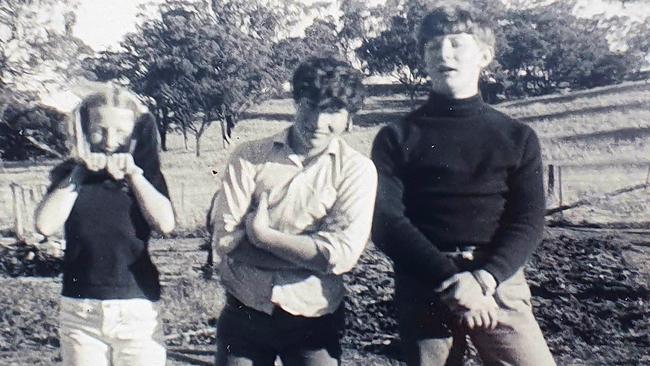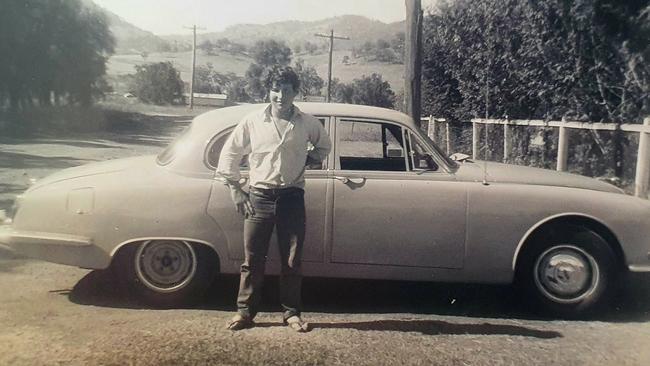Missing Persons Week: Teen Mick Croaker focus of AFP launch 47 years after his disappearance
The AFP are sharing the story of country teenager Mick Croaker, who vanished from a hospital he was supposed to be safe in in 1973, to try and find answers decades on.

NSW
Don't miss out on the headlines from NSW. Followed categories will be added to My News.
- Perish murder gang brother to be paroled after 20 years
- Inside look at the cops finding NSW’s missing persons
Trisha Croaker was 13 when her big brother Mick went missing from a Sydney hospital, but the “blanket of grief” that settled over her family in the early 1970s has never truly lifted.
This week the Australian Federal Police are using Missing Persons Week to highlight Mick’s casein hopes of getting answers for the Croakers after 50 years of silence.
Mick was a teenager in the 1970s — he’d ride his pushbike as fast as he could along the dirt tracks that wound through the Croaker property at Scone.

Trisha remembers him as a smiley, shaggy haired and farm-strong young man.
These aren’t her final memories of Mick, but they’re her favourites 47 years after he vanished from Prince Henry Hospital in the city.
“You have awareness in the country of life and death,” she told The Daily Telegraph.
“You’re prepared at an early age for people dying or marrying or having kids but nothing prepares you for someone going missing.”
Mick’s life was tough, he was a twin but complications during birth left him with intellectual disabilities.

His twin brother has a brilliant mind and went on to become a surgeon, Trish remembers a divide because of how different they were.
Mick stuttered badly and struggled to read, schoolwork was nearly impossible and the other children were cruel.
Trisha remembers seeing kids bully him, mimicking his jammed up speech.
Home life was challenging as well, their father was sharp and suffered no fools. Mick found solace in his mother, Trish said she would do anything to protect him.
Mick’s mother tried to get him help, he was medicated for depression in his teen years, but it was the 70s and mental health was not what it is today.
The Croakers took their son a full day’s drive to the hospital in Little Bay in the city in October 1973.

They drove to Sydney and admitted him and drove back to Scone thinking they’d come get him in a few days,” she said.
“Two days later he’d disappeared with his possessions left in the hospital. They were very suspicious circumstances and it was hard — he was supposed to be cared for and protected there.”
The cliffs were searched nearby but nothing was ever found and it broke her mother.
The family suspected foul play, the hospital was hard to get answers from, they felt.
Trisha remembers the endless searching her mother and father carried out to try and find Mick, and the cruel pranks from the sickest members of the public.
MORE NEWS
Search underway after bones found at La Perouse beach
Cops probe Bomaderry fight as man on murder charge
She recalls them driving to Cairns and Adelaide after someone called up with a sighting only to find out people thought it would’ve been a laugh to say they’d seen Mick alive
But one sighting sticks in her head – a woman in Sydney said she’d spoken to a man she believed was Mick who said he was lost and trying to get home and he missed his mother.
“She was devastated, my mother always hoped he’d come home,” she said.
“We sat under this blanket of grief, it had been thrown over us. It settled on us. You’d feel guilty if you felt happy.”
“Mick was basically a child and would remain a child, I think we all knew that he wouldn’t have a life, he wouldn’t be able to start again like some people who disappear manage to do“
The NSW coroner would tell Mick’s mother that he was sorry that every system failed her, Trisha recalled.

The official finding, in 2009, was that Mick was dead but the date, place, cause or manner of death was unable to be determined.
His frail, ageing mother simply told the court that it was “too little too late”.
She died one year later. The stress, Trisha says, had empowered the cancer that killed her father 12 years after Mick vanished.
Trisha, her twin Wendy, and their surviving brother, David, still have the homestead up at Scone.
Mick’s gold pocket watch, with an engraving from their parents, is now one of their most treasured possessions.
His suitcase of clothes, which he had taken to the hospital, has never been unpacked with his mother and now his younger sisters unable to cross that bridge.

Trisha said her mother and father moved hell and high water to keep Mick’s name in TV in the media.
She wanted to raise her voice for them when the AFP announced they wanted to use Mick in the missing persons campaign.
She urged everyone to look at the faces of the missing persons registry, read their stories and try to think of any details that might help investigators.
